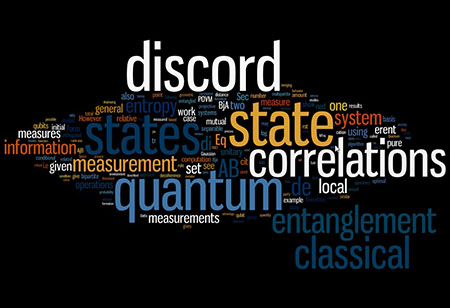Highlights
New Scientist publishes "Big Idea" feature by CQT researchers

The essay in New Scientist by Hugo and Kavan follows their co-authorship of a more scholarly (and much longer) review article on discord in Reviews of Modern Physics, which generated the word cloud above.
New Scientist magazine has published an essay by CQT research fellow Hugo Cable and CQT alumnus Kavan Modi on the "hot but controversial" topic of quantum discord. The article appears in the 16 November issue of the weekly print magazine and on the newscientist.com website. New Scientist reaches over 3 million readers each week.
The essay describes how evidence is growing that technologies can gain advantages from noisy quantum systems – characterised by the quantum property of discord – rather than needing pure entanglement. Pure entanglement is challenging to achieve because quantum systems are easily disturbed by environmental influences such as stray electromagnetic signals and heat, and this has been a stumbling block in building quantum devices for computation and sensing.
The article is called "Brave new quantum world" in print and "Noise is the key to quantum computing" online. It appears in the opinion section of the magazine in a slot called "The Big Idea". In the article, Hugo and Kavan, who is now at Monash University in Melbourne, Australia, write "It has been exciting to be a part of this rapidly evolving field of research, observing at first hand the emergence of a big unifying idea".
Kavan and Hugo have previously been among the co-authors of a review article on discord. They also co-organised the first international conference on discord, which was held in Singapore in January 2012.






